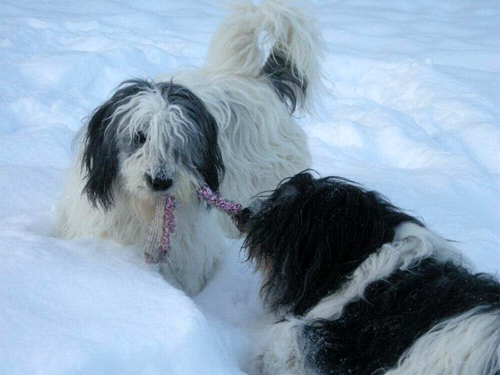According to online research, kelp supplies a natural source of
minerals to a canine's body and minerals are essential in every
aspect of canine health. Researchers in the field have found that
supplementing a canine's diet with kelp can result in vital health
benefits:
- Balancing Glandular Activities
The rich iodine content and high levels of other nutrient
minerals and vitamins in kelp make it an important herb for
regulating and balancing glandular systems. Specifically, dogs
suffering from hypothyroidism can benefit from the iodine in
kelp. One of the functions of iodine is the stimulation of the
thyroid gland. A significant number of PONS suffer from
hypothyroidism and would benefit from kelp in their diets.
Please consult your family veterinarian for additional
information.
- Healthy Skin and Coat
PONS with skin irritation issues as a result of allergies will
also benefit from kelp. In a scientific study, dogs who had been
fed kelp daily for a period of six months had darker, thicker,
and shinier coats. They tended to scratch less often and their
skin was not as dry.
The protein in kelp is highly bio-available, which allows dogs
to efficiently assimilate its amino acids so they can speedily
and effectively assist in tissue repair. Both PON show dogs and
pets will benefit from kelp. Consult your family vet for
additional advice.
- Flea Control
In the same study, it was found that kelp for dogs could help
flea management. Dogs were found to be less attractive to fleas
and flies after three weeks of supplementation.
- Weight Control
Dogs can have better maintenance of body weight thanks also to
the iodine in the kelp. Iodine stimulates the thyroid gland that
controls the dog's metabolism. With better metabolism, PONS with
weight problems can reduce their cholesterol levels and lose
weight.
- Better General Health
With better metabolism as a result of improved glandular
activities, PONS who are given kelp supplements will enjoy
better general health. This may be particularly important for
older PONS whose metabolism may be poor and glandular and immune
functions may be compromised.
Not all seaweeds are alike and owners should avoid offering kelp
harvested along U.S. shorelines because such seaweeds might be
contaminated by industrial pollution. Norwegian kelp is considered
to be of the highest quality due to the environment in which the
kelp grows. The Norwegian coast is where fresh arctic ocean water
meets mineral-rich glacial freshwater run-off, which combine to
create the optimal conditions for kelp to thrive.
Kelp is generally safe for canines if offered in the appropriate
amount. The easiest way to supplement kelp is to get a natural kelp
product in powdered form and follow the feeding and dosage
instructions on the product label. Please keep us updated on the
benefits of kelp and your PONS.

